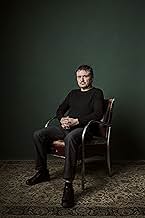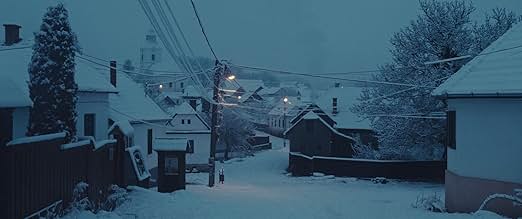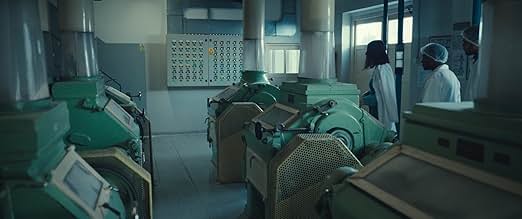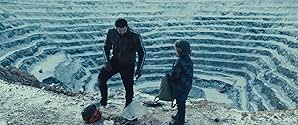IMDb RATING
7.2/10
5.8K
YOUR RATING
A non-judgmental analysis of the driving forces of human behavior when confronted with the unknown, of the way we perceive the other and on how we relate to an unsettling future.A non-judgmental analysis of the driving forces of human behavior when confronted with the unknown, of the way we perceive the other and on how we relate to an unsettling future.A non-judgmental analysis of the driving forces of human behavior when confronted with the unknown, of the way we perceive the other and on how we relate to an unsettling future.
- Awards
- 7 wins & 18 nominations
- Director
- Writer
- All cast & crew
- Production, box office & more at IMDbPro
Storyline
Did you know
- TriviaThe town hall meeting scene (starting at about 1 hour 28) is a single unbroken take lasting nearly 15 minutes.
- SoundtracksYumenji's Theme
Composed by Shigeru Umebayashi for In the Mood for Love (2000)
Featured review
Cristian Mungiu is one of the "founding fathers" of the Romenian new wave that started around 2005 with movies such as "The death of Mr Lazarescu" (2005, Cristi Puiu), "12:08 East of Bucharest" (2006, Corneliu Porumboiu) and of course the breakthrough movie of Mungiu himself "4 month, 3 weeks and 2 days" (2007). More than 15 years later the Romenian new wave is still alive and kicking. In 2022 the experienced director Mungiu delivers an excellent movie with "R. M. N" but there is also the "new name" Alexandru Belc with "Metronom". New name is maybe a bit exaggerated because Belc already contributed to the script of "4 month, 3 weeks and 2 days".
"Metronom" is situated in 1972 during the Ceausescu years and is thus typical Romenian. "R. M. N" covers more general themes. It is about Matthias (Marin Grigore) and his home village. After working in Germany for a while Matthias returns to his home village. In this village three Sri Lankan workers arrive at the local bakery because vacancies are difficult to fill (many workers work in the West). The arrival of the Sri Lankan workers leads to a lot of tension in the local community.
The above description seems to indicate that "R. M. N" is above all about racism, and that is not entirely untrue. In a key scene with a duration of twenty minutes there is a meeting in the village hall. In this meeting all prejudices against the Sri Lankan (and foreigners in general) are given free reign.
In my opinion "R. M. N" is about racism but not only about racism. It is also about hypocrisy. I give a number of examples.
In the first place Romanians working in Germany is no problem, but a Sri Lankan working in Romania is.
The film is situated in Transsylvania, a region with a Hungarian minority. This minority wants not to be discriminated against, but on the other hand has no problem discriminating other people.
There are also people defending the Sri Lankan workers, but this are their employers that have an economic interest. Their defence that no Romenian reacted on the vacant positions meets with the reply that they were only willing to pay minimum wages. So their bevaviour has at least a hint of hypocrisy to it. They are certainly not the good guys against the evil and dumb majority. In the films of Mungiu there seldom is a simplistic good versus bad distinction. In this respect the portrayel of one of the empoyers (Csilla Szabo played by Judith State) as always drinking a glass of red wine and always playing the cello was already a bit too "bourgeois" to my liking.
The village of the movie is situated on the edge of a primaeval forest. This is no coincidence as the forest symbolizes mystical and animal spirits, with recurring references to brown bears. These animal spirits overtake rational thought when it comes to reacting to foreigners. This is illustrated in the meeting in the village hall (in the scene already mentioned to) when some villagers tried to wrap their prejudices in rational arguments (maybe the foreigners carry unknown viuses with them). When their argument is refuted (we let them work with protecting rubber handshoes) the prejudice inside shows itself (but we simply don't want them here).
"R. M. N" is an ominous film with mob violence constantly in the air. In this respect it resembles "Werckmeister Harmoniak" (2000, Bela Tarr), although the last mentioned film is more abstact. The resemblance was for me the most obvious in the new years day parade with people in bear costumes fighting a neighbouring village as part of a new year tradition. For me this scene was the most Tarr like combining in an abstract manner animal spirits with xenophobia. The twenty minutes scene in the village hall did the same thing, but in a much more concrete way. This scene is more characteristic of Cristian Mungiu himself.
"Metronom" is situated in 1972 during the Ceausescu years and is thus typical Romenian. "R. M. N" covers more general themes. It is about Matthias (Marin Grigore) and his home village. After working in Germany for a while Matthias returns to his home village. In this village three Sri Lankan workers arrive at the local bakery because vacancies are difficult to fill (many workers work in the West). The arrival of the Sri Lankan workers leads to a lot of tension in the local community.
The above description seems to indicate that "R. M. N" is above all about racism, and that is not entirely untrue. In a key scene with a duration of twenty minutes there is a meeting in the village hall. In this meeting all prejudices against the Sri Lankan (and foreigners in general) are given free reign.
In my opinion "R. M. N" is about racism but not only about racism. It is also about hypocrisy. I give a number of examples.
In the first place Romanians working in Germany is no problem, but a Sri Lankan working in Romania is.
The film is situated in Transsylvania, a region with a Hungarian minority. This minority wants not to be discriminated against, but on the other hand has no problem discriminating other people.
There are also people defending the Sri Lankan workers, but this are their employers that have an economic interest. Their defence that no Romenian reacted on the vacant positions meets with the reply that they were only willing to pay minimum wages. So their bevaviour has at least a hint of hypocrisy to it. They are certainly not the good guys against the evil and dumb majority. In the films of Mungiu there seldom is a simplistic good versus bad distinction. In this respect the portrayel of one of the empoyers (Csilla Szabo played by Judith State) as always drinking a glass of red wine and always playing the cello was already a bit too "bourgeois" to my liking.
The village of the movie is situated on the edge of a primaeval forest. This is no coincidence as the forest symbolizes mystical and animal spirits, with recurring references to brown bears. These animal spirits overtake rational thought when it comes to reacting to foreigners. This is illustrated in the meeting in the village hall (in the scene already mentioned to) when some villagers tried to wrap their prejudices in rational arguments (maybe the foreigners carry unknown viuses with them). When their argument is refuted (we let them work with protecting rubber handshoes) the prejudice inside shows itself (but we simply don't want them here).
"R. M. N" is an ominous film with mob violence constantly in the air. In this respect it resembles "Werckmeister Harmoniak" (2000, Bela Tarr), although the last mentioned film is more abstact. The resemblance was for me the most obvious in the new years day parade with people in bear costumes fighting a neighbouring village as part of a new year tradition. For me this scene was the most Tarr like combining in an abstract manner animal spirits with xenophobia. The twenty minutes scene in the village hall did the same thing, but in a much more concrete way. This scene is more characteristic of Cristian Mungiu himself.
- frankde-jong
- May 31, 2023
- Permalink
- How long is R.M.N.?Powered by Alexa
Details
- Release date
- Countries of origin
- Languages
- Also known as
- МРТ
- Filming locations
- Panemar - Râtu Mare FN, Jucu, Cluj County, Romania(baking factory)
- Production companies
- See more company credits at IMDbPro
Box office
- Gross US & Canada
- $46,360
- Opening weekend US & Canada
- $6,121
- Apr 30, 2023
- Gross worldwide
- $738,520
- Runtime2 hours 5 minutes
- Color
- Aspect ratio
- 2.39 : 1
Contribute to this page
Suggest an edit or add missing content
























